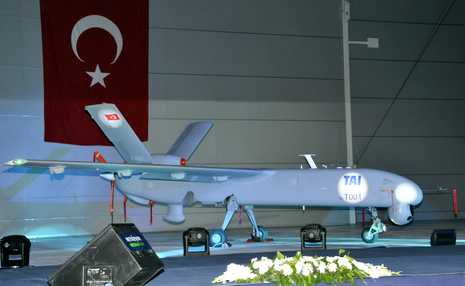Israeli Prime Minister Binyamin Netanyahu granted the Turkish Prime Minister Tayyip Erdogan a face-saver for ending their three-year rift out of willingness to crown US President Barack Obama’s three-day visit with an impressive diplomatic breakthrough. He swallowed Israel and its army’s pride and, at the airport, with Obama looking on, picked up the phone to Erdogan and apologized for the killing by Israeli soldiers of nine Turkish pro-Palestinian activists in 2010 aboard the Mavi Marmara, which was leading a flotilla bound on busting the Israeli blockade of the Hamas-ruled Gaza Strip.

The crowing comment by Turkish Foreign Minister Ahmet Davutoglu – “Turkey’s basic demands have been met; we got what we wanted” – was out of place, spiteful and ill-mannered.
He knows perfectly well that for the past year, amid a constant stream of ranting abuse from Ankara, Israel has been quietly responding to Turkey’s desperate need for cooperation in four essential fields, which are disclosed here by DEBKAfile:
1. The Turkish armed forces are heavily dependent on Israeli military technologies from the long years of the close alliance between the two countries, which Ankara cut short. This dependence applies most particularly to its drones, the backbone of today’s modern armies. It is also holding up the huge transaction for the sale of American Boeing Awacs electronic warning airplanes to Turkey.
Boeing was unable to deliver the aircraft without Jerusalem’s consent, because a key component, the early warning systems, is designed in Israel. This consent has been withheld in the face of Turkey’s urgent need and the US aviation firm’s impatience to consummate the deal.
Turkey is in need of those planes – not just to monitor events in neighboring wartorn Syria, but to complete its air defense lineup against Iranian ballistic missiles. Without the AWACs, the advanced FBX-radar system the US has stationed at the Turkish Kurecik air base is only partly operational. The Kurecik battery is linked to its equivalent at a US base in the Israeli Negev, a fact which Ankara chooses to conceal.
2. In view of the turmoil in Syria, the bulk of Turkey’s exports destined for the Persian Gulf and points farther east have been diverted to the Israeli ports of Haifa and Ashdod, whereas just a year ago, they went through Syria, Jordan and Saudi Arabia.
Since no end is seen to the Syrian conflict and the closure of the Turkish-Syrian border, more and more export traffic from Turkey is making its way through Haifa port and thence by rail across Israel to Jordan. Turkish goods bound for destinations in Europe and the US are diverted to Israeli ports too as Egyptian ports are made increasingly dysfunctional by that country’s economic crisis..
3. In the first year of the Syrian uprising, when Davutoglu was still a frequent traveler to Damascus for talks with Bashar Assad, Ankara entertained high hopes of becoming a major player for resolving the Syrian debacle. But he also sought to strike a deal with the Lebanese Hizballah, Assad’s ally, for obstructing Israeli gas and oil exploration in the eastern Mediterranean
Three years on, Turkish leaders have woken up to the realization that they had better hurry up and jump aboard the US-backed Israeli energy bandwagon or else they will miss out on an outstanding and lucrative economic development, namely, the forthcoming opening up of a Mediterranean gas exporting route to Europe.
4. Turkey, Israel and Jordan are all in the same boat as targets for the approaching large-scale use of Syria’s chemical and biological weapons.
This topic was high on the agenda of President Obama’s talks with Jordan’s King Hussein Friday, March 21, in Amman, after he had explored the subject with Israel’s prime minister in Jerusalem.
Obama presented them with his plan to consolidate into a single US-led Turkish-Israeli-Jordan HQ the separate commands established six months ago in each of those countries to combat the use of unconventional weapons.
This unified command would stand ready to launch units of the four armies into coordinated land and air action inside Syria upon a signal from Washington.
The US president used his visits to Jerusalem and Amman to tie up the ends of this contingency plan with Netanyahu and Abdullah, while Secretary of State John Kerry got together with Erdogan in Ankara.
However, this four-way military effort to combat the Syrian chemical threat could not have taken off with Ankara and Jerusalem not on speaking terms.
This had been going on for three years, ever since Erdogan suspended military ties with Israel and downgraded diplomatic relations pending an Israeli apology for the Marmara incident, compensation for the victims and the lifting of its naval blockade on Gaza.
The Turkish prime minister insisted on the Israeli prime minister paying obeisance to Turkish national honor. And finally Netanyahu relented. But Israel stood its ground on the last condition; a UN probe had pronounced the Israeli blockade legal and legitimate although its raid on the Turkish ship was deemed “excessive.” So the blockade remains in place and, indeed, Friday, March 23, Israel’s new defense minister, Moshe Yaalon, tightened it by restricting the Gaza offshore areas open to Palestinian Mediterranean fishermen.
This was punishment for the four-rocket attack staged from Gaza on the Israeli town of Sderot Thursday, the second day of President Obama’s visit to Israel.
DEBKAfile’s military sources comment that the new defense minister may have also been directing a reproach at the prime minister for apologizing to Turkey and admitting to “operational errors,” thereby casting aspersions on the professionalism of the Israel Navy’s Shayetet 13 commando unit and its legitimate action in defense of Israel’s legal Gaza blockade